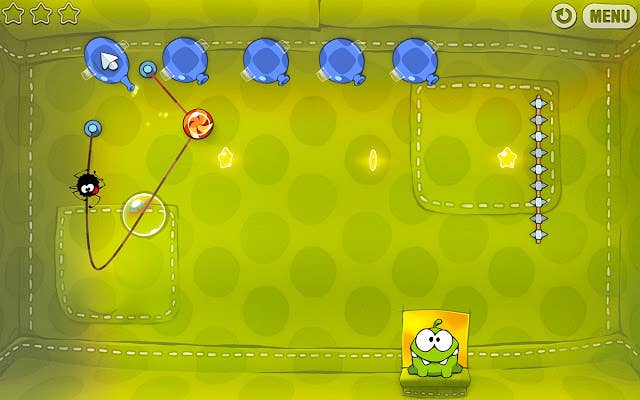ZeptoLab: "There's no way around it. Devs need to understand the numbers"
CEO Misha Lyalin discusses the increasing focus on metrics in mobile games, as well as his company's quest to publish the next big hit
This article was first printed in the GamesIndustry.biz Mobile Newsletter. To receive these special emails, sign up here.
It's a truth many developers no doubt wish to avoid: the creation of games is not a purely artistic affair. Ultimately, their games need to be released and, in the vast majority of cases, that release needs to generate enough revenue to fund their next project.
This is particularly true on mobile, arguably the most competitive market any games developer faces. And while there will be the rare exception who can afford to pour their heart and soul into a passion project, any studio that hopes to attract a publisher and reach the broadest audience needs to understand the more commercial aspects of launching a game.
"Business has become very number-oriented: retention, ARPPU, and things like that," ZeptoLab chairman and CEO Misha Lyalin tells GamesIndustry.biz.
"It's something we can work on once a game goes through our process but the initial phase has to show potential. It's easy to measure just by giving the game to your friends and family to play - that's what we're looking for. We don't really like people who just submit a title, saying 'here's my game, I played it, I like it'. That's something that has been left in the past. Now developers need to gain an understanding about numbers as soon as they humanly can."
But to a new developer, a start-up with dreams of getting their games into the hands of millions, are metrics like MAU, ARPDAU - not to mention other acronyms like LTV, FTUE and so on - incredibly intimidating?
"To some, yes," Lyalin admits. "Some people develop something and hope that the world will love it. But developers now have to change. We have changed.
"You need to do soft-launches and look through all the metrics before launch. Developers need to adapt to this. There's no other way around it"
"When we released Cut The Rope, we were exactly the same: we were making games and hoping that people would like them when they were released. But we have changed, and developers have to change as well. Now you need to do soft-launches and look through all the metrics you gather before you fully launch your game. Developers need to adapt to this, it's the reality. There's no other way around it."
ZeptoLab is the latest mobile studio to decide to channel its own success into helping other developers bring their games to market. The firm's publishing arm has kept a low profile so far, but recently announced it was open to any and all submissions - even promising a guaranteed response to every single applicant.
The Cut The Rope studio is not alone in this. There are countless indie publishers on the rise, in both the mobile and PC/console spaces, but ZeptoLab is confident it has what it takes to stand out and aid its fellow developers.
"People that publish in the mobile space have to have experience," Lyalin says. "And if developers want to have their game published, they have to have something companies will want.
"It's tough, it's definitely tough. We're definitely not guaranteed to find all the good titles [because of all the competition]. But we have certain competitive advantages, and the way we approach our games and development is potentially beneficial to third-party developers as well. So we feel strong as the competition grows."

But if developers want to win over ZeptoLab, it comes back to those all-important numbers - although perhaps not on the scale you might think.
"We're impressed by some sort of numbers, some sort of reaction to the game," Lyalin explains. "If a developer can gauge certain feedback from close friends, a small circle of people or maybe launch the game somewhere - in one or two markets, so we can see some preliminary numbers - I think all that helps."
Unlike most developers that open a publishing arm, ZeptoLab is being incredibly selective - hence its decision to only discuss its publishing operations with developers at conferences and trade shows until recently. Even though the firm is open to all submissions, it intends to release a maximum of two titles per year.
"We're just looking for games we'd be proud to say were published by ZeptoLab. That's why we're being very selective"
"We're looking for the same things we expect from our games: fun, quality and innovation," says Lyalin. "We're just looking for games we'd be proud to say were published by ZeptoLab. We're looking for something our players would enjoy as much as they have our own games. So that's why we're being very selective.
"It's our intent to treat them as internal titles. If we do that, we just don't have that many people to be able to do so many games."
Like King, Zynga and many of the leading mobile firms, ZeptoLab hopes to find the next big mid-core hit. 'Mid-core' is a term bandied about by many a company trying to step away from the impossibly crowded casual market, but everyone has their own definition as to what this actually means.
"For us, a mid-core game is a free-to-play title that is easy to pick up and play, but relatively hard to master," Lyalin says. "The long-term retention potential [needs to be] there.
"We're not looking for titles that are targeted at a very niche audience. Broader audience, easier to pick up and play, long term retention with free-to-play mechanics - that's what we would define as mid-core."
With the likes of Clash of Clans, Game of War and Mobile Strike dominating the Top Grossing charts for years now, developers could be forgiven for thinking multiplayer games are the only titles that can establish themselves in the market now. Lyalin believes that it's not essential, but it can give developers the best chance of gathering, and more importantly retaining, the largest audience.
"You don't have to have multiplayer to succeed. But people are social - they like to interact with other people"
"You don't have to have multiplayer to succeed," he says. "But people are social - they like to interact with other people. If recent history has shown us anything, it's that people are becoming more social on the net with things like Facebook. It's the same thing with games, so multiplayer is an important concept - especially for core games. Maybe not for casual, but for core and mid-core games, it's vital."
Submissions are already rolling in at ZeptoLab, but the publisher has so far stood by its promise to respond to every single developer. Lyalin says this is made possible by the number of people at the company willing to chip in and help to review the games, they receive. However, while a response is promised to all applicants, the CEO stresses that those who have put in the most effort can expect the more comprehensive feedback.
"Obviously, if the submission is at an early stage, the reply will be fairly short," he says. "But if you submit a game that's playable, we'll give you a full review - regardless of whether we publish it or not.
He goes on to say that by offering feedback to all developers, ZeptoLab hopes to encourage those it rejects to come back in future: "If you hear just 'no, the game doesn't work for us' or you don't hear anything, the chances of going to this publisher [again are minimal]. If you establish lines of communication earlier, maybe next time you'll come in and you'll remember some of the things you were told, so the quality of submission will improve. That way, we pass some knowledge to the partner and hopefully that comes back to us later."






.jpg?width=291&height=164&fit=crop&quality=80&format=jpg&auto=webp)

